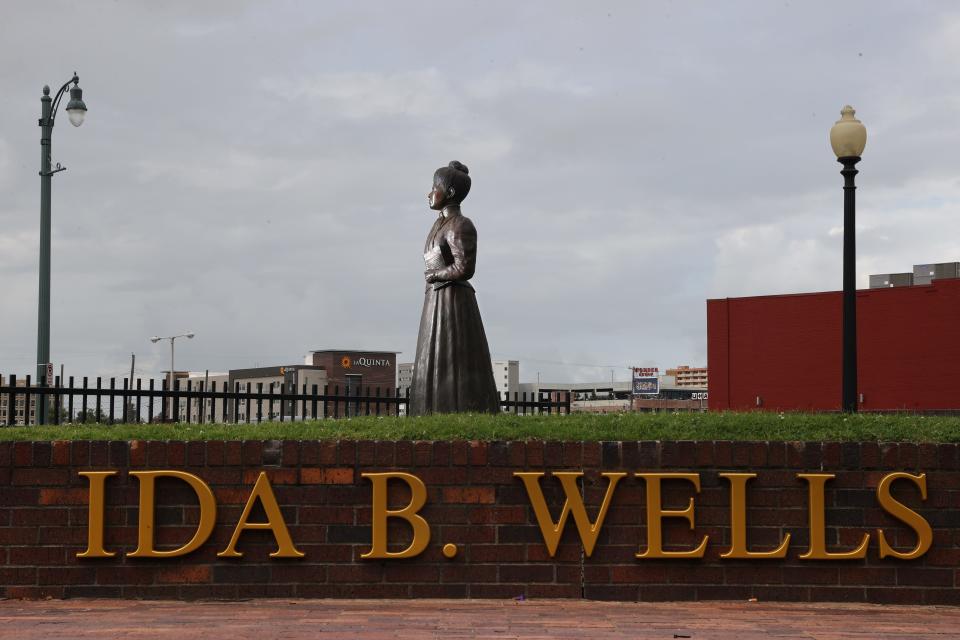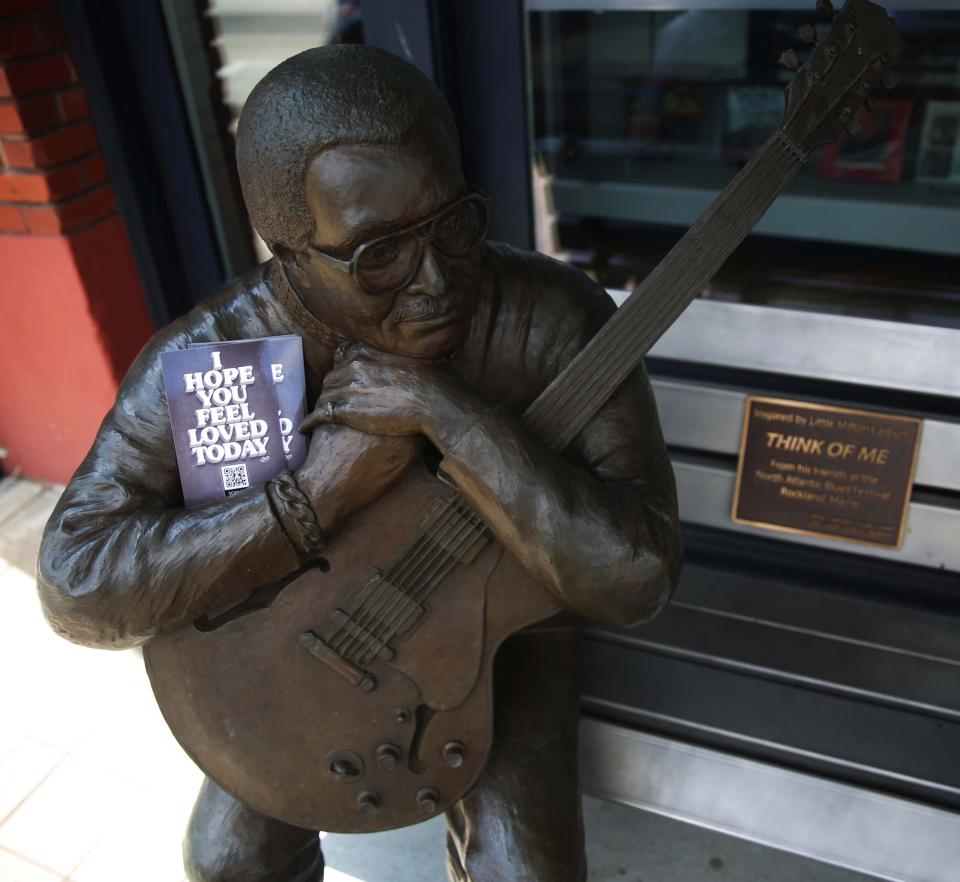How well do you know your monuments to Black Americans? Here's a primer.
- Oops!Something went wrong.Please try again later.
Memphis is a city rich in African American history. From early 20th Century businessmen to civil rights icons to blues legends, our city has much Black history to boast about. And memorable stories continue to be made in our communities today.
Books have been written about our legends, so for now I’ll just focus on the statues and monuments that have been erected to honor Black Americans in our city, state and tri-state area.
We all should know about Tom Lee, the African American roustabout that was honored as a hero in 1925 after he rescued 32 people when a riverboat capsized on the Mississippi.
Lee made regular runs from Memphis to Helena, Arkansas, in a skiff, and ended up being the only witness when the M.E. Norman went down 15 miles downriver from Memphis. It is said that Lee could not swim, but he steered his small boat back and forth five times from the wreckage to shore, continuing to search for people even after dark.
The city of Memphis hailed Lee a hero. He was transported to Washington to meet President Calvin Collidge, and survivors bought him and his wife a furnished house and provided food and gifts every Christmas. The city even gave him a job. Two years after Lee died in 1952, Memphis renamed its riverfront park Tom Lee Park, and erected a tall obelisk in his honor. Storms toppled the obelisk twice. A more modern bronze statue honoring Tom Lee was dedicated in 2006. The 30-acre Tom Lee Park in recent years underwent a $60 million-plus renovation.
Another view by Lynn Norment: Homeless people died in the recent snowstorm. Memphians must extend our hearts and hands.
Anti-lynching crusader Ida B. Wells was honored in the 21st century
Another heroic historical figure celebrated with a statue is Ida B. Wells. In 2021, a life-size statue of the anti-lynching crusader, journalist and educator was unveiled at Fourth and Beale streets in Memphis. Adjacent to the Ida B. Wells plaza is the historic Beale Street Baptist Church, where freed slaves worshiped, and in the early 1890s housed Well’s newspaper, Memphis Free Speech and Headlight.

Black media giant John H. Johnson also is commemorated with a life size statue, but in Delta Heritage State Park in Arkansas City, Ark., his hometown. The statue was unveiled on November 1, 2023, the fifth John H. Johnson Day in Arkansas. It was created by Little Rock sculptor Susan Holley Williams.
I had the pleasure of working with this dynamic publisher and businessman in Chicago, where he founded Johnson Publishing Company in 1942, Ebony magazine in 1945 and Jet magazine in 1952. The iconic magazines were staples in the homes of Black Americans and others across the country. From the 1960s through the 2000s, Johnson Publishing Company was the largest Black-owned publishing company in the United States.
Mr. Johnson, as many referred to him, was named to the Forbes list of 400 wealthiest Americans in 1982 and received the Presidential Medal of Freedom from President Bill Clinton in 1996.
It also should be noted that the 10-ton “The Mountaintop” monument dedicated to Dr. Martin Luther King Jr. now sits in the MLK Reflection Park in downtown Memphis.
It took more than 100 years after the Civil War for monuments to Black Americans to appear on federal lands
Research shows that no statues were erected on federal lands to honor African Americans until 1974, when a monument was unveiled of Mary McLeod Bethune in Washington, D.C.
The Martin Luther King Jr. Memorial was installed in D.C., in 2011. In fact, Dr. King is No. 4 among the top 50 individuals represented with statues, plaques and parks across the U.S. Also on that list is abolitionist and Underground Railroad leader Harriet Tubman (No. 24), and abolitionist and writer Frederick Douglass (29th).
Musicians and athletes are honored with statues much more often than other accomplished African Americans. A life-size statue of Larry Finch, beloved figure in University of Memphis basketball, stands outside the Laurie-Walton Family Basketball Center on UM’s south campus. The statue captions No. 21 in action during his 1,869-point career. He later was basketball coach for UM.
Without a doubt, Memphis lives up to its “Music City” moniker with an array of statues paying homage to legendary music makers. Among them is a statue of renowned blues musician W.C. Handy, considered the father of the blues. He was the first to put on paper the music genre that originated in the fields of the Mississippi Delta. Handy’s statue stands in Handy Park on Beale Street.
Most appropriately, an engaging statue of blues master B.B. King stands in the lobby of the Tennessee Welcome Center on Riverside Drive. Born in Mississippi, King found fame in Memphis with his unique guitar technique and distinctive voice that earned him 15 Grammy awards as well as audiences with presidents and popes. A statue of the blues king also graces a park named for him in Indianola, Miss., where he spent much of his youth.
B.B. King is among the famous singers honored in stone
In 2017, celebrated musician and singer Bobby “Blue” Bland was memorialized with a life-size statue at the corner of South Main Street and Martin Luther King Jr. Avenue, one block south of Beale. Bland was inducted into the Blues Hall of Fame, the Rock and Roll Hall of Fame, and the Memphis Music Hall of Fame. He also was honored with a Grammy Lifetime Achievement Award.

The statue of Little Milton (Campbell) looks appropriately at home seated on a bench at 421 South Main Street. The Mississippi-born blues and soul singer and musician in 1953 landed a recording contract with Sun Records in Memphis, and later recorded with Stax as well as Malaco Records based in Jackson, Mississippi. Through his career, Little Milton released 29 singles and 17 albums that were listed on Billboard music charts. He also was inducted into the Blues Hall of Fame.
Besides being home to Little Milton and B.B. King and his statue and museum, our neighboring state hosts the Mississippi African American Memorial which stands imposingly at the Vicksburg National Military Park. Dedicated in 2004, the 9-foot, 3,000-pound bronze sculpture on a pedestal of black African granite honors Mississippians of African descent who participated in the Vicksburg Campaign during the Civil War. The sculpture’s three Black male figures depict anatomical, proportional and historical accuracy. It is one of the largest tributes to African American soldiers on any Civil War battlefield within the National Park Service.
Pulaski, Tennessee, works to move past its Ku Klux Klan story
Here in Tennessee, the United States Colored Troop National Monument was installed in 2006 in the Nashville National Cemetery. The monument, a statue of a single Black soldier in the midst of the military cemetery, is “In memory of the 20,133 who served as United States Colored Troops in the Union Army.”

In 2021, Franklin, Tennessee unveiled a U.S. Colored Troop statue in its public square as part of the city's "Fuller Story" efforts to include African American history in that spot, which for more than hundred years only featured a monument to Confederate soldiers.
Last June, in Pulaski, Tennessee, officials unveiled a life-sized Resurrection of Valor statue of a Black Civil War soldier. The bronze monument honors thousands of the region’s Black troops who fought with the U.S. Army during the Civil War. A town with a population of about 8,000 near the Alabama border, Pulaski has been known for being the birthplace of the Ku Klux Klan. Its leaders obviously wanted to enhance the town’s image.

These statues and monuments are striking reminders of the contributions that African Americans have made to our city and region, as well as to our country.

Let us take a cue from these outstanding individuals that we, too, have always had great leaders, and each of us can individually contribute to our society. We are Black history in the making.
Lynn Norment, a columnist for The Commercial Appeal, is a former editor for Ebony Magazine.
This article originally appeared on Nashville Tennessean: Black Americans are honored in monuments across Memphis and Tennessee

